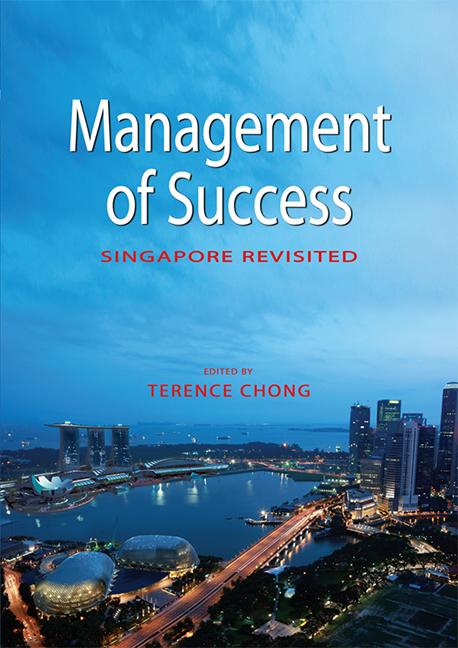Book contents
- Frontmatter
- Contents
- List of Tables and Figures
- Foreword
- Message
- Quote
- Preface
- The Contributors
- 1 Introduction: The Role of Success in Singapore's National Identity
- SECTION 1 SINGAPORE IN THE BIGGER PICTURE
- SECTION 2 LEADERSHIP, POLICY AND POLITICS
- SECTION 3 THE RESTRUCTURING OF THE ECONOMY
- SECTION 4 THE TRANSFORMATION OF SOCIETY
- 11 The Ageing Population
- 12 Managing Labour Flows: Foreign Talent, Foreign Workers and Domestic Help
- 13 Social Mobility in Singapore
- 14 Singapore's Print Media Policy: A National Success?
- 15 Control-shift: The Internet and Political Change in Singapore
- 16 The Transformation of Meritocracy
- 17 Education in Singapore: Sorting Them Out?
- 18 Religious Diversity in Singapore
- SECTION 5 THE LAW
- SECTION 6 MODIFICATION OF THE ENVIRONMENT
- SECTION 7 COMMUNITY AND NATIONAL SECURITY
- SECTION 8 LIFE IN SINGAPORE
- Index
16 - The Transformation of Meritocracy
from SECTION 4 - THE TRANSFORMATION OF SOCIETY
Published online by Cambridge University Press: 21 October 2015
- Frontmatter
- Contents
- List of Tables and Figures
- Foreword
- Message
- Quote
- Preface
- The Contributors
- 1 Introduction: The Role of Success in Singapore's National Identity
- SECTION 1 SINGAPORE IN THE BIGGER PICTURE
- SECTION 2 LEADERSHIP, POLICY AND POLITICS
- SECTION 3 THE RESTRUCTURING OF THE ECONOMY
- SECTION 4 THE TRANSFORMATION OF SOCIETY
- 11 The Ageing Population
- 12 Managing Labour Flows: Foreign Talent, Foreign Workers and Domestic Help
- 13 Social Mobility in Singapore
- 14 Singapore's Print Media Policy: A National Success?
- 15 Control-shift: The Internet and Political Change in Singapore
- 16 The Transformation of Meritocracy
- 17 Education in Singapore: Sorting Them Out?
- 18 Religious Diversity in Singapore
- SECTION 5 THE LAW
- SECTION 6 MODIFICATION OF THE ENVIRONMENT
- SECTION 7 COMMUNITY AND NATIONAL SECURITY
- SECTION 8 LIFE IN SINGAPORE
- Index
Summary
CLASS POLITICS IN SINGAPORE?
In the 1989 volume of Management of Success, Ezra Vogel identified a “strong central meritocracy” not only as one of the pillars of good government in Singapore, but also as a type of government that Singapore leaders — namely, the People's Action Party (PAP) government — had historically chosen to establish. Remarkably, meritocracy in the selection of bureaucrats, commonly practised among the East Asian countries, extended, in Singapore's case, to the selection of political leaders as well, with academic performance as a pivotal measure of merit. Amidst triumphant though spurious attempts to explain the East Asian economic miracle of the 1980s in terms of “Confucian” virtues such as meritocracy, Vogel could already point critically to the way that meritocracy in Singapore also emitted an “aura of special awe for the top leaders … [which] provides a basis for discrediting less meritocratic opposition almost regardless of the content of its arguments”. In 1984, for instance, then Prime Minister Lee Kuan Yew publicly compared the GCE ‘O’ Level results of the PAP candidate and his electoral opponent, suggesting that if the former were to lose, democracy's one-man-one-vote principle would itself need to be questioned. Articulate, confident, and energetic, political leaders in Singapore were part of what Vogel vividly called a “macho-meritocracy”.
Meritocracy is an essentially unstable concept, binding aspects that work together in productive tension. Over the decades, the delicate balance between the contradictory egalitarian and elitist aspects of meritocracy, preserved so skilfully by the PAP government in the decades following Singapore's independence, has shifted towards a market-driven concern with rewarding the winners, leaving the losers more sceptical about their own prospects for upward mobility. Today, meritocracy and, in particular, its macho manifestations are coming under strain as fast-globalizing Singapore gears up to deal with new forms of national crisis, alternative sources of information and beliefs about merit, and widening income disparity, all of which the government finds itself less able to control fully. More deeply embedded in the networks and flows of globalization, Singapore is facing new forces that are threatening to pull apart and destabilize this long-standing pillar of governance.
- Type
- Chapter
- Information
- Management of SuccessSingapore Revisited, pp. 272 - 287Publisher: ISEAS–Yusof Ishak InstitutePrint publication year: 2010

